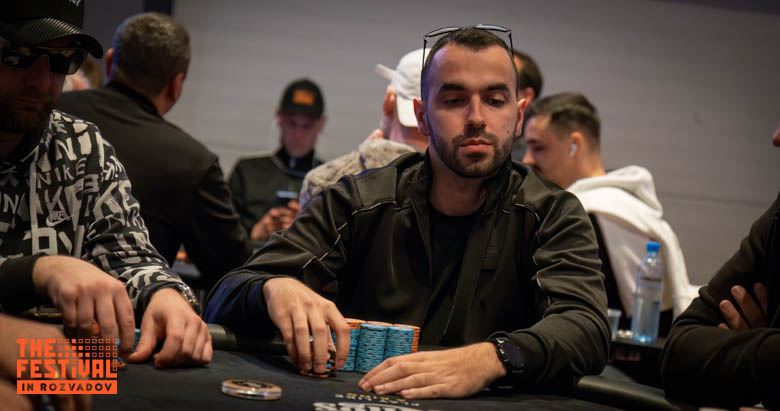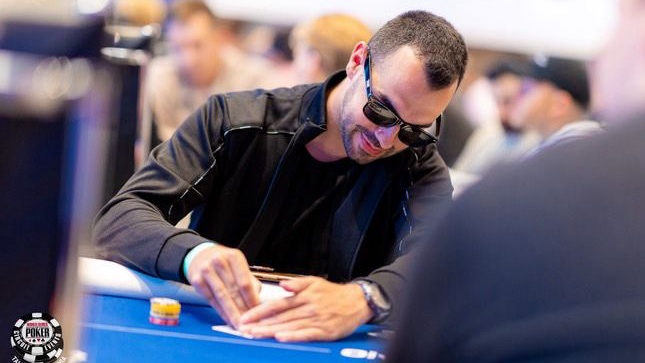If you had to introduce yourself to someone who’s never heard of you, how would you describe what you do—whether it’s poker, creating videos, or any other content you’re passionate about?
Well, my name is Alex Georgiev, I’m from Sofia, Bulgaria, and I’m 29 years old. I’ve been playing poker for more than 10 years now, but honestly, it was on and off during the first couple of years. I only got serious about it in the last three years. I’ve also been streaming for the past two and a half years, just started streaming in English this year. Before that, I was a software developer, but I quit my job to do this full time. Possibly making the dream come true. So far, it’s going well. I also travel a lot — not really around the world, mostly around Europe — to play poker and make some content.
What are you aiming for these days? And if you could put your biggest dream into words, what would it be?
I’m already a full-time streamer, but maybe to get enough steady poker streaming income to support my life long-term. Poker has a lot of variance, so some years might be better than others. Income stability is important. And of course winning a big Main Event live would be something that I still dream of.
What’s the story behind how you got into poker?
That’s an interesting question. I started playing at a very young age, actually. It was real money but very small stakes, like one or two cents. Over the years, I played here and there as a hobby. Then, around 2020, I started becoming a consistently winning player — not huge winnings, but profitable, which motivated me to play more. I actually learned a lot from watching streamers. I would watch streams every day, even fall asleep with streams on. Big streamers like Lex, Spraggy, Fintan, and the Staples brothers — who are now my colleagues at PartyPoker, which is crazy. I’d watch them play, think about how I would play before they made their moves, and then adjust my own style accordingly. So, watching streams was a major way I learned poker. Of course, now I have coaching sessions and use software tools, but mostly it started with watching streams.
Was it the strategy side of poker that first drew you in? And what’s the part of the game you love the most?
Competition. I’m very competitive. I’ve done sports all my life — football for about 10 years, athletics, and various sports. I also used to play video games competitively. My first job was in League of Legends coaching, helping players improve their ranking. That was from age 17 to 22, then I moved to software development, and now poker. I’m driven by wanting to win — I want to be better than others and I’m willing to put in the grind. Poker is similar to video games in that sense — you have to play thousands of games to get good.
Do you remember your first big win or any memorable places poker has taken you?
My first big win was online, playing Sunday Million after satelliting in from an $11 buy-in. The first hand I got was aces against kings — and I lost! That tilted me because I wasn’t mentally prepared. I kept registering satellites and ended up second in a $109 tournament, playing as a short stack and then chip-leading near the end. I woke up the next day and told my girlfriend I won about $14,000 from $11. That’s still my biggest win. I also won some live tournaments, for example in Rozvadov, about last year or so. I was supposed to go to Rozvadov again this year, but had a bachelor party and other events, so it’s hard to combine everything with streaming and my personal life. But quitting my job was one of the best decisions — now I can do what I want, when I want.
Let’s circle back to your streaming — what kind of content do you usually put out?
I stream my own gameplay, playing six to eight tournaments simultaneously and commentate on what I’m doing. I explain why I make certain moves, kind of like I’m doing now. I want to entertain and teach, especially beginners, by sharing my thoughts during hands so people can understand how a poker player thinks.
What do you think sets your streams apart from others out there?
Honestly, I don’t think there’s a huge difference between me and others. We’re all trying to entertain and teach. Some play higher stakes, some micro stakes. What I try to do differently is take my followers on the journey with me — I started streaming playing two or three dollar tournaments and now I’m playing much higher stakes. I also make some content outside of streaming. When I’m at live tournaments, I show important hands, share stories, sometimes show the city I’m in. I want my followers to feel like they’re with me. People in my stream have seen me grow through the past few years.
Do you think it’s realistic to make a living from streaming and content creation?
Yes, it is. You get partnerships, sometimes you advertise. I’ve been partnered with BWIN for more than two years and now I am officially PartyPoker Tour ambassador. That support helps, especially during tough months when you’re not winning. Sometimes you go three or four months without winning, and then you win three tournaments in a row and it makes your whole year. Poker income is very unstable.
Do you enjoy the unpredictable, “in the flow” lifestyle that comes with streaming and content creation?
Poker in general is very unstable and insecure — going from a good job in Bulgaria to something where you don’t know if you’ll have income this month takes courage. Once you build a bankroll that can sustain your lifestyle, it gets easier. The main concern is not going broke, so bankroll management is crucial. For example, I sell action on bigger live tournaments because my bankroll can only support tournaments up to 250-300 euros. Selling action isn’t because I doubt my ability, but it’s standard bankroll management.
How do you work on improving your poker skills? Are there any specific tools or methods you rely on?
Playing is the best way to learn. I also use tools like GTO Wizard and have a coach. I’d like to do more coaching, but sometimes with traveling and streaming, it’s hard to find time. My coach is another Bulgarian streamer who streams in English, his nickname is EvaluatePoker. Overall, I’m happy with the coaching. Also, it’s important to work out and do sports to keep mentally and physically fit.
Why do you believe physical health matters for a poker player?
At the end of the day, if your body isn’t healthy, your mind probably won’t work at 100%. So, you need to work out, do some sports, and get yourself in shape. If you look at all the top professionals, they all work out. Have you ever seen a very, very successful player who doesn’t work out? It’s very rare. Most of your mental game comes from your body as well. It’s a combination. When you work out, you think clearer, you feel better, and when you feel better, you play better.
What do you feel poker gives you in life, and on the flip side, what has it taken away?
Poker has two sides. On the fun side, if you’re successful, it can give you a lot of free time to spend with friends and family. It can bring more money, which you can spend on your loved ones. It can also give you a sense of calm—no need to wake up to an alarm at 9 AM for a regular job. It can make your life much happier. Personally, I’m much happier now than when I was working a regular job. The only stress comes when you’re in big tournaments and the stakes are high.

But poker can also take a lot from you if you don’t manage your time well. It can affect your relationships—your partner might not always understand that sometimes you have to play for hours or travel for weeks without seeing them. That’s tough. Not everyone will be okay with it. Sometimes you can lose people you love because of poker. It’s a demanding lifestyle.
Also, poker is mentally brutal. Some players are really good but fail because they aren’t mentally strong enough. If you can’t handle huge downswings and losses, this game is not for you. I’ve seen many talented players give up because they couldn’t handle the mental pressure or manage their bankroll properly.
Do you think for them is possible train their mental strength and become professionals?
Absolutely. Everyone can improve mentally. There are many tools and professionals who can help. But most people aren’t willing to put in the work. It’s a process; I didn’t get mentally strong overnight. It took years to stop caring about bad beats. Even now, when bad runs happen repeatedly, it can get to me. But you learn to accept it. You have to keep improving on how you handle situations.
Could you share an example of how you’ve worked on your mental strength in poker?
Sure. The other day, I busted out of a live tournament on the bubble with a very strong hand. But it didn’t bother me because I had the bankroll and knew I made the right decision. Sometimes things just aren’t in your control. You have to focus on playing your best, and whatever happens, happens. The only time I get frustrated is when I lose because I didn’t play well, not because of bad luck. That kind of frustration is manageable and much less frequent.
What helps you the most to keep your mindset strong and learn from mistakes?
For me, sports help the most. I still play football, go to the gym, meet people, and get my mind off the game. After a big series or a month of nonstop playing, I usually take a vacation to reset. If you only play poker all the time without breaks, you’ll burn out. You need to step away sometimes.




